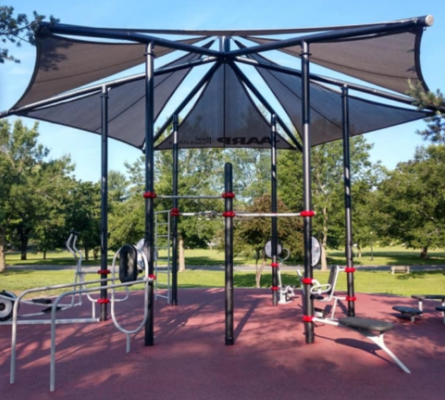How Gyms in Public Green Spaces Can Build Resilient Communities
It turns out I’m not alone. Public spaces, particularly those that become community gathering places for exercise, are a key component in building the sorts of connected communities that make for both healthy, resilient individuals, and neighborhoods.
- Adam Mejerson, As the executive director of FitLot, Adam continuously works to help communities throughout the country find the resources they need to plan, build, and program outdoor fitness parks.
- Jill Moore, Inclusive Play Specialist at Landscape Structures.
- Kimberly Burrowes, Kimberly Burrowes is a technical assistance manager in the Research to Action Lab at the Urban Institute. Burrowes’s research has focused on advancing racial equity in parks and public spaces, practices and policies for affordable housing solutions, and participatory engagement.
“When you think about the benefits of parks and how they're accrued to individuals, you're thinking about your physical, mental health, well being, and things like that,” says Kimberly Burrowes, a researcher at the Urban Institute who has studied the benefits of parks. “But then there are communal benefits around social health and environmental health, too.”
“Social health” is the official name for that feeling that I get while reaping the benefits of exercising in parks, which Burrowes describes as “really talking about community connectedness, how much do you feel that you can connect to your neighbor, you belong, you identify.” Research shows that people thrive in cities with diversity and social health.

{{post.sponsorText}}
But those benefits don’t just happen by developing some new green space. Making parks accessible to people of all ages and abilities is crucial, Burrowes says.
Access can be achieved in a number of ways. Just a few examples are by making park structures wheelchair-friendly, by placing parks in communities of all income levels, by making programming free and affordable, and by ensuring a police presence doesn’t make people feel surveilled or unsafe.
“All this goes back to park equity and ensuring that the parks that we're building, the structures we’re putting in, and the programming all match the needs of the users and the community,” Burrowes says. “You will find that people as a community will come together when they have similar interest in programming or using certain types of fitness equipment, or just general use of space in ways that they may not have thought about using it before.”
One organization, called FitLot, is pushing this concept of gyms in public parks forward. Over the last several years, it’s worked with local governments and community organizations to place accessible gym structures in 53 parks across the country, and more are in development. Adam Mejerson started FitLot in the wake of Hurricane Katrina, as a way to help reinvigorate affected communities.
“We've really done everything we could to just take the walls off of the gym and make it cost free and create opportunities for people to just sign up for a free class and maybe meet some of their neighbors and exercise with an instructor who probably lives in their neighborhood,” Mejerson says. “So that part I think is creating more comfortable opportunities for people to just try something that they really want to learn.”
According to Burrowes, FitLot’s origin story fits right in to the larger narrative of public spaces can be sanctuaries for the people they serve, since parks have been linked to helping communities literally weather storms before, during, and after natural disasters. There is also evidence that outdoor gyms in particular are “spaces where community-dwellers can find social connectedness while participating in structured physical activity at no cost,” found one review of the literature on outdoor gyms.

To give you a sense of how an gyms in parks operate, FitLots host group fitness classes that accommodate all fitness and ability levels, and QR codes placed on the equipment take people to links where they can learn how to use different pieces, much of which is adjustable so people can personalize their experience. “And our programs and classes will have 17 year olds and 70 year olds taking the same class,” Mejerson says. “Someone might be working in a restaurant and someone else might be running a company and for that hour, they're just all exercising together. It's really fun to see.”
Mejerson stresses that he is just one of many stakeholders in this space. And there are other organizations that are working toward the same end through outdoor gyms, as well, such as Greenfields Outdoor Fitness. “These parks to me are actually more of like a big welcome flag,” he says.
It’s a sentiment seconded by Jill Moore, an inclusive play specialist at Landscape Structures, the organization that makes structures for FitLot. “Creating a space that is inclusive says, ‘We want you there,’” she says. “‘We want to invite you, and we think that you have something to offer.’”
Oh hi! You look like someone who loves free workouts, discounts for cutting-edge wellness brands, and exclusive Well+Good content. Sign up for Well+, our online community of wellness insiders, and unlock your rewards instantly.
Loading More Posts...